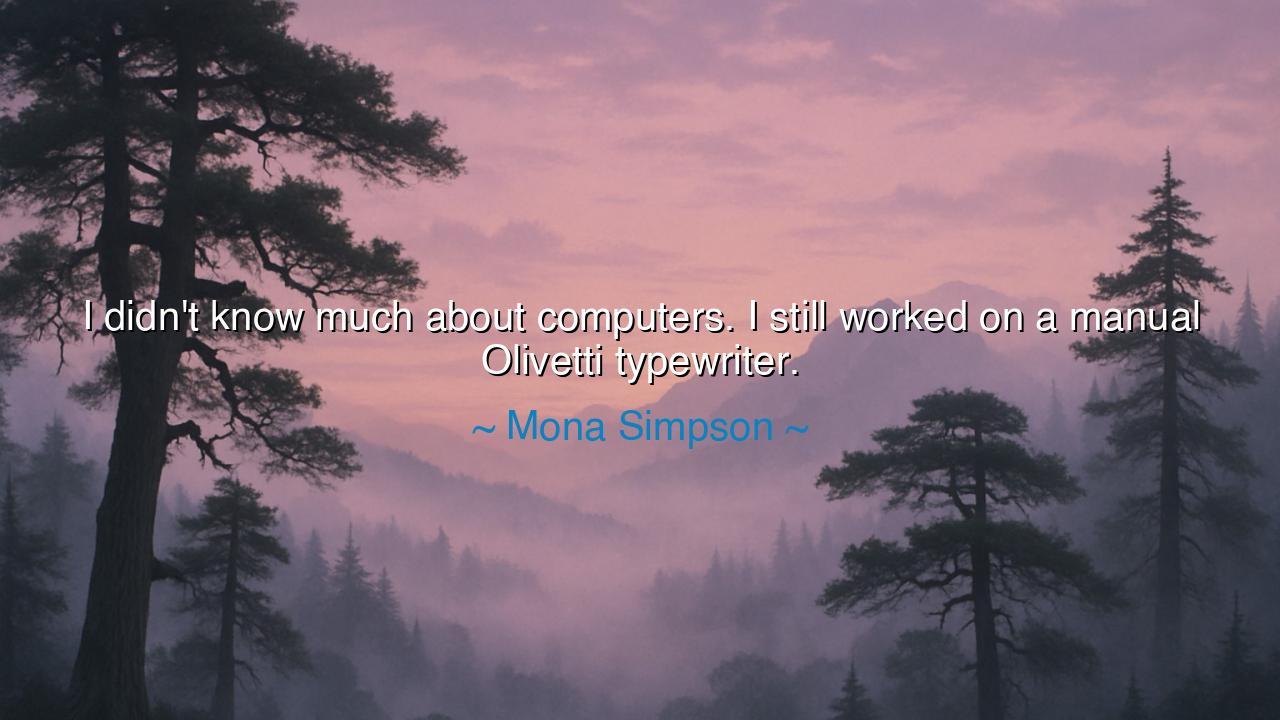
I didn't know much about computers. I still worked on a manual






In the quiet, contemplative words of Mona Simpson, novelist and sister to the legendary Steve Jobs, we hear the echo of two worlds colliding — the analog past and the digital dawn: “I didn’t know much about computers. I still worked on a manual Olivetti typewriter.” Beneath this simple confession lies not ignorance, but a profound statement about authentic creation, the rhythm of labor, and the enduring connection between hand, mind, and art. Simpson’s words remind us that while the world races forward into ever-advancing technology, there is wisdom in the slowness of creation — in the resistance to haste, in the embrace of tangible tools that respond to the pulse of the body, not the hum of the circuit.
The origin of this quote lies in the contrast between Simpson’s literary path and her brother’s technological empire. While Steve Jobs helped usher humanity into the digital age, Mona remained devoted to the craft of writing — to the tactile process of thought translated through ink, paper, and sound. Her manual Olivetti typewriter was more than a machine; it was a companion in solitude, a gatekeeper of discipline. Every keystroke required intent, every revision demanded patience. Unlike the effortless deletion of a digital file, a typed mistake bore its mark, a testament to imperfection and endurance. In a world transforming through the rise of computers, Simpson’s words stand as both memory and meditation — a reminder that art, at its deepest, is born not from speed but from stillness.
This image of Simpson — surrounded by paper, hearing the rhythmic clack of the typewriter — speaks to something eternal in the creative spirit. The ancients carved words into stone and painted symbols upon papyrus; the medieval monks illuminated their manuscripts by candlelight. Each act of creation was an offering of time and presence, a dialogue between the human and the material. To write on a manual typewriter is to join that lineage — to give form to thought through effort and attention. Her resistance to computers was not a rejection of progress, but an honoring of the sacred slowness through which ideas become real. For her, art was not about convenience; it was about communion with the work itself.
Consider, too, the deeper irony in her life’s story — that Mona Simpson, sister to one of the architects of modern computing, chose to create without the very tools her brother had built to revolutionize creation itself. Yet this contrast is not contradiction, but balance. Steve Jobs sought to make technology intuitive, beautiful, and human. Mona, in her way, sought to preserve humanity within art — to ensure that emotion and imperfection did not vanish in the efficiency of machines. Together, though by different means, they reflected the two halves of creation: innovation and introspection, speed and soul.
History, too, has known such divisions. When the printing press was invented by Johannes Gutenberg, many feared that the art of hand-copying manuscripts would disappear forever. Monks, who once labored for years on a single illuminated page, mourned the loss of beauty to the mechanization of thought. Yet what truly perished was not artistry, but exclusivity — and what was born was the expansion of knowledge itself. In the same way, Mona Simpson’s Olivetti typewriter stands as a symbol of what must not be lost amid the flood of digital progress: the intimacy of creation, the grounding of the artist in her own patience and effort.
In Simpson’s choice, there is a lesson for all who live in the age of convenience. Technology grants us infinite tools, but it also tempts us toward distraction and immediacy. The typewriter, by contrast, teaches focus; it demands the presence of the body, the patience of the spirit. When she says she “didn’t know much about computers,” she also implies something greater — that knowing the self, knowing the rhythm of one’s own mind, is worth more than mastering any machine. Her craft required silence, and in that silence, she found her voice.
The lesson of her words is not to reject progress, but to remember that creation begins in consciousness, not in the tool. The computer, the pen, the typewriter — these are but instruments. What matters is the soul that wields them. In a world obsessed with efficiency, Simpson’s wisdom calls us to slow down, to let thought ripen before it becomes expression. If you would create — whether with words, art, or invention — do not rush to the digital solution. Take time to listen, to labor, to build by hand when you can. For in the friction between mind and matter, the truest ideas are born.
So, children of the digital age, remember the quiet wisdom of Mona Simpson and her Olivetti typewriter. The hum of machines will grow ever louder, but never let it drown out the sound of your own heart at work. There is still power in the deliberate keystroke, the handwritten note, the unhurried sentence. The world needs not only creators of speed, but guardians of meaning — those who remember that the deepest art, like the deepest wisdom, is not downloaded, but discovered slowly, through the gentle discipline of the human touch.






AAdministratorAdministrator
Welcome, honored guests. Please leave a comment, we will respond soon